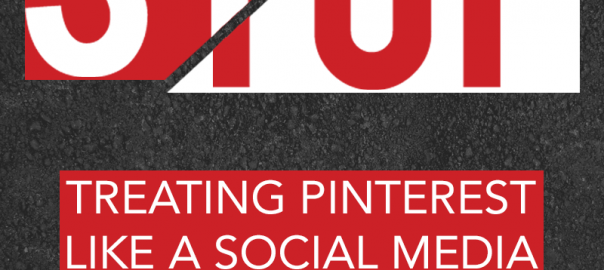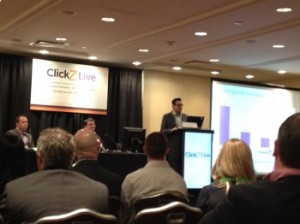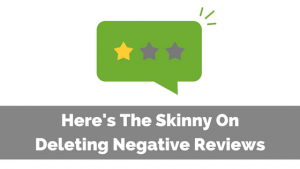I know, I know. Pinterest IS technically a social media platform. However, it’s a platform that’s unlike any of the other major networks. Pinterest is one part social, one part search, and two parts inspiration, making it a completely unique platform. If you continue to treat Pinterest like Facebook and Twitter, you’re making a huge mistake. Keep reading to learn why.

The News Isn’t News On Pinterest.
Something newsworthy happens. You want to know and share real-time information on the event. There’s a good chance you’ll be heading to Twitter to check the trending topics, retweet news source, and stay up-to-date with what’s happening. Or, you might open up Facebook to see what your friends have to say about the event. But I’m willing to bet your Pinterest feed will not be one of the tabs you check.
In fact, when I checked the Shared Count of a CNN article discussing the trending topic of Mike Huckabee’s bid for the US presidency, I found that there were plenty of shares but no one pinned the article:

But why is Pinterest ignored when it comes to the news?
Well for one, the Smart Feed places emphasis on quality of content – not necessarily the timing of content. Because of this, Pinterest’s algorithms prefer to surface pins that stand the test of time in users feeds. These pins will be the ones that are helpful, are from value-adding domains, have already proven themselves on Pinterest, and will often be rich pins. With these types of high-quality pins, it actually does make sense to schedule them to go out when your audience is online since they will be surfaced higher in the feed. However, once a pin is on Pinterest it can surface in search results for months – or even years – after it was pinned. So, if I pinned the article about Mike Huckabee and it surfaced in a user’s search result on US presidents 2 years from now, that user would just end up with a puzzled look rather than their desired result.
Not only does the Smart Feed work against time-sensitive articles, but Pinterest users also tend to focus on the positive aspects of life and leave the controversial topics to other networks. Often pinners are planning for a major life event or planning for a better future. They’re coming to Pinterest to be inspired and find something that can make their life better. The last thing they want to interrupt their search for the perfect vacation destination is a fight over Mike Huckabee – regardless of what political side they may stand on.
Hashtags Are Not Made For Pinterest.
While Twitter (and to some extent, Facebook) sorts tweets chronologically by hashtags, Pinterest sorts pins by relative categories and interests. Although you can click on hashtags on Pinterest, they don’t necessarily point to all of the pins that include that hashtag and the pins are in no particular order. Plus, because Pinterest is inspiration based, by providing a hashtag for someone to click on, they are not clicking on your pin to go to your website.
When thinking about your content being surfaced on Pinterest, don’t rely on the preconceived notion of hashtags to be found. Craft pins that will be useful to pinners with thoughtful, keyword rich descriptions and add them to boards with defined categories.
Images > Text.
Taking a scroll through your Facebook and Twitter feeds, you might notice that the sites are pretty text heavy. Sure, you’ll probably see an inspiring quote from a brand and some pictures from your friends night out, but other than that the sites are almost entirely text-based updates:

Now, take a scroll through your Pinterest feed and you will see a stream of (hopefully) eye-catching images:

In fact, you can’t create a post on Pinterest without an image – even if it’s just a screenshot of some text (but please, don’t do that). Although the descriptions are important on Pinterest – especially when it comes to setting yourself up for Pinterest SEO success – the images are what people are looking for.
Pinterest is for discovery, not discussion.
Now, perhaps Pinterest’s most important differentiating factor is why people are on the site. People are on Pinterest to discover new things, plan for a future event, or just get inspired. They are not on the site to discuss Mike Huckabee, look at your new puppy (unless it’s REALLY cute) or to ignore brand advertising. They are searching for new experiences – starting a new life with their partner, planning a new place to visit, trying a new way to decorate their home or their body. The discovery side of Pinterest makes the site more equivalent to a Google or a Bing – not a Facebook or Twitter.
So am I crazy or am I right? Should Pinterest be treated as a social media platform? Let me have it in the comments.
(186)





